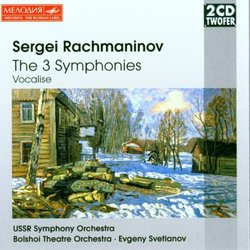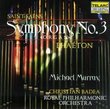| All Artists: Yevgeny Svetlanov, USSR State Symphony Orchestra, Rachmaninoff Title: Symphonies 1-3 Members Wishing: 0 Total Copies: 0 Label: Melodiya Release Date: 5/20/1997 Genre: Classical Styles: Historical Periods, Modern, 20th, & 21st Century, Symphonies Number of Discs: 2 SwapaCD Credits: 2 UPC: 743214006429 |
Search - Yevgeny Svetlanov, USSR State Symphony Orchestra, Rachmaninoff :: Symphonies 1-3
 | Yevgeny Svetlanov, USSR State Symphony Orchestra, Rachmaninoff Symphonies 1-3 Genre: Classical
|
Larger Image |
CD DetailsSimilarly Requested CDs |
CD ReviewsThe performances of passion and emotional zest. David A. Hollingsworth | Washington, DC USA | 12/10/1999 (5 out of 5 stars) "Svetlanov performances with the USSR State Symphony (Symphony #1 and Vocalise), with the Bolshoi Theater Orchestra (Symphony #2), and with the USSR Radio and Television Large Symphony Orchestra (Symphony #3) were done with passion and conviction. Sergei Rachmaninov (1873-1943) wrote the symphonies and other works out of the Tchaikovkyian sentimentality, beauty, and emotionism and Svetlanov and the above-mentioned orchestras managed to capture the essence and even the greatness of Rachmaninov' music. Well done. The recording sound is somewhat shallow and raw, but adequate. Of the other recordings of Rachmaninov symphonies, Svetlanov was most effective in bringing out the Russian-ness of Rachmaninov symphonies without exaggerations. Rachmaninov was Russian and proud of it and Svetlanov portrayed this great composer without a hint of under-representation. Highly recommendable." Magnificent Performances D. A Wend | Buffalo Grove, IL USA | 04/11/2007 (5 out of 5 stars) "I was privileged to attend a performance of the Rachmaninov First Symphony (composed 1895/96)conducted by Maestro Yevgeney Svetlanov conducting his USSR Symphony Orchestra, and it was an unforgettable experience. The recording in this set of the First brings that performance back to life and is certainly the best recording of the work available; no other recording has been able to match the depth of emotion and expression that Maestro Svetlanov has achieved. The only recording that comes close to the same visceral performance is Eugene Ormandy and the Philadelphia Orchestra. The turmoil reflected in the First Symphony was possible mirrored in the composer's life at the time; the symphony is dedicated to Anna Alexandrovna Ladyzhenskaya, a married woman of Gypsy extraction with who Rachmaninov was probably in love with. The symphony contains some gypsy-like melodies including a fragment from the Dies irae. The score quoted a live from Deuteronomy that was also quoted by Tolstoy in Anna Karenina: "To me belongeth vengeance, and recompense."
The Second Symphony (1906/07) is a world apart from the First reflecting a settled middle-life. The music was composed in Dresden, which was an international music center at the time. The Second is probably considered Rachmaninov's most "romantic" work but careful listening reveals the tensions underlying the music. The first movement is has an atmosphere of brooding broken by stormy passages and the second movement is a Scherzo that is frenzied and includes a brief quote from the Dies irae in the form of a brass chorale. The third Adagio movement begins with a lovely, romantic melody that has been popularized in "pop" music; the finale brings together theme from the prior movements with glorious effect. Because of the 60 minute length of the symphony and that the composer was unsure of himself as a symphonist; the Second was subjected to some cuts. I grew up listening to a recording by Ormandy and was very much surprised to discover that there was much more music to be heard. The cuts have been restored but there are several recordings prior to the 1960's that played the cut version. Maestro Svetlanov's performance is uncut. The Third Symphony (1935/36) comes from the composer's exile in Switzerland and is cast in three movements. Once again, Rachmaninov has used the Dies irae theme in the final movement and also in the ghostly beginning notes of the first. The Third is pessimistic music; Rachmaninov no longer believed in the moral growth of people and the martial music, particularly in the first movement, suggests the cataclysmic war that was coming. The sound of these recordings is not the best but the performances are among the best available. There are times during the First Symphony when the loudness of the orchestra (particularly the tympani) distorts the sound; however, the sheer power of the performance demands that it be heard. The Bolshoi Theater Orchestra performs the Second Symphony with great beauty and the recording quality is much improved but a bit cavernous sounding. The Third Symphony is better engineered even though it is the earliest (1962) of the recordings. If you already have other Rachmaninov symphony cycles you should try this one as well. " |

 Track Listings (6) - Disc #1
Track Listings (6) - Disc #1